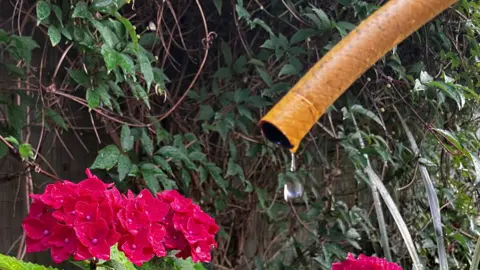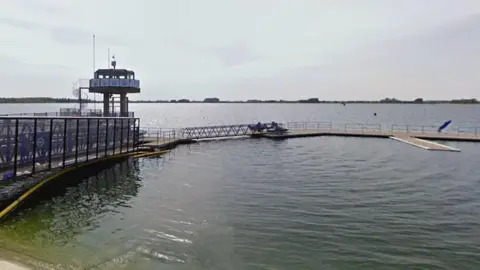Hosepipe ban - 'good idea' or 'repair the leaks'?
 BBC
BBCCustomers who will be affected by Thames Water's hosepipe ban said they were "surprised" it had not happened sooner, with others adding they thought it was a "good idea".
Some also criticised the utility company which has struggled to fix leaks and has been fined for breaching rules over sewage spills and shareholder payouts.
Thames Water said the measure would come into effect on 22 July for households across Gloucestershire, Oxfordshire, Berkshire and Wiltshire who were supplied by Farmoor Reservoir near Oxford.
Announcing the ban which would affected more than a million people, it said a lack of rain and increasing demand had stretched water supplies.
The temporary restriction will affect 1.1 million people across areas with postcodes beginning with OX, GL, SN, RG4, RG8 and RG9.
Thames Water said prolonged hot weather meant there was less water available as well as a higher demand, with customers using up to 30% more water when temperatures were above 25C.
It comes as the water company's bosses are set to be quizzed by MPs on Tuesday as part of an inquiry into reforming the water sector.
Wessex Water, which also supplies parts of Wiltshire said there was "still no need" for a hosepipe ban in its areas as it draws water from groundwater sources.

John Gellard, from Caversham in Berkshire, said: "I'm surprised it hasn't come quicker to be honest because it's been so dry and water's so precious.
"People don't realise how precious it is until it starts running out."
The 69-year-old added: "I mean look at other areas of the country."
Hosepipe bans are already in force for customers of Yorkshire and South East Water as a result of the dry weather, affecting 5 million and 1.4 million people respectively.
'Excessive bonuses'
Commenting on BBC Berkshire and BBC Oxfordshire Facebook pages, some users were angry about the hosepipe ban being implemented when water was being lost through leaks in pipes.
"Maybe Thames Water could repair some leaks then," said one user.
"Just collect your water from the nearest water main leak, there should be one within five minutes' walking distance," quipped another.
Users also criticised the company which was fined £122.7m for breaching rules over sewage spills and shareholder payouts in May.
"Thames Water needs to stop using water rate money to fund excessive bonuses for their bosses and shareholders while neglecting the essential maintenance of our water utility network," another user commented.
In May, the company decided to "pause" its scheme to pay out big bonuses to senior executives linked with securing its £3bn rescue loan.
Some customers were also worried about rising costs.
"Another kick in the teeth from Thames Water, does that mean we [sic] going to pay more for this?" one asked.
"How much do we get off our bill for you stopping us from using the water?" questioned another.

Andrew Simmons, from Caversham, said: "There could be more investment in their infrastructure, and then they wouldn't need a hosepipe ban.
"We spent a lot of time and effort in our garden to grow nice plants and it would be a shame for them to die, and it would cost money to replace them."
The ban outlaws the use of a hosepipe for activities such as watering the garden, washing the car or filling a paddling pool.
Mr Simmons said the latter could be problematic as paddling pools were often used to "cool kids or dogs down".
He added: "You don't want people getting heat stroke."
People found to be using a hosepipe during a hosepipe ban can be fined up to £1,000.
"Water has to be saved somehow and it's quite a good idea," 87-year-old June Bright said.
Although the ban will not affect her as she lives in an apartment, Ms Bright said: "It might help people to think about what they're using their water for."
Mr Gellard said: "What I'll do is just use the watering cans, use what I need and let the grass go brown because it will come back, eventually."
 Google
GoogleThames Water is currently planning to build a £2.2bn South East Strategic Reservoir Option (SESRO), near Abingdon, Oxfordshire, to cope with increasing demand and climate change.
The project would cover an area the size of Gatwick Airport and the company said it would secure supplies for 15 million people.
The plan though is currently awaiting the outcome of a judicial review heard at the High Court last month.
The GMB Union described Thames Water's hosepipe ban as "disgraceful" given it had leaked 200 billion litres of water in the last year.
A Thames Water spokesperson said leakage across its network was at its "lowest ever level" but said the firm knew there was "more work to do".
You can follow BBC Oxfordshire on Facebook, X (Twitter), or Instagram.
